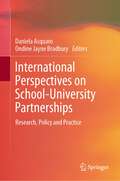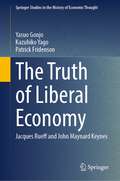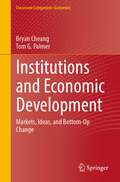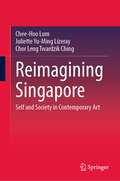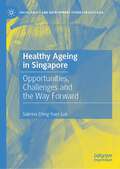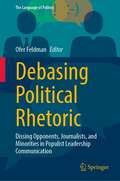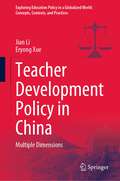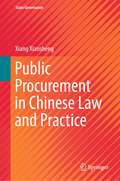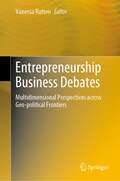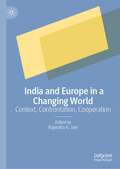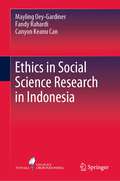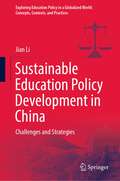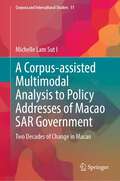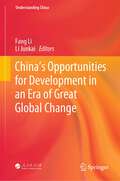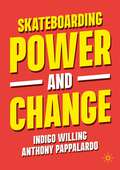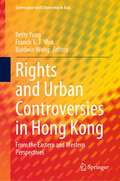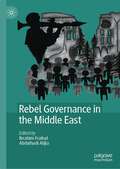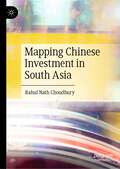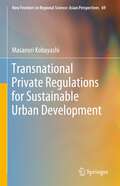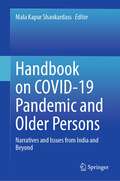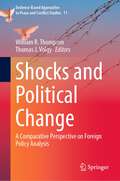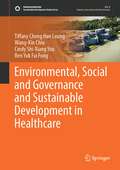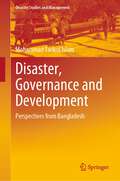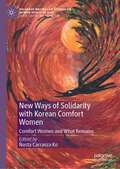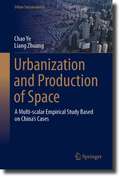- Table View
- List View
International Perspectives on School-University Partnerships: Research, Policy and Practice
by Daniela Acquaro Ondine Jayne BradburyThis book draws together international scholarship on school–university partnerships challenging thinking about purpose and sustainability as well as the power of collaboration in transcending organisational and contextual boundaries. Moving beyond transactional arrangements, the book showcase various models of school–university partnerships, and explores the role of policy, research, and practice, across the life cycle of partnerships. This edited collection presents a strong body of evidence with global significance, providing valuable insights into catalysts for partnerships, the drivers for transformational change, and generative growth resulting from authentic collaboration. An important reference for all teacher education providers, schools, and educational stakeholders, this book showcases global examples of the power of partnerships in an era necessitating cross sectoral collaboration to address contemporary societal challenges.
The Truth of Liberal Economy: Jacques Rueff and John Maynard Keynes (Springer Studies in the History of Economic Thought)
by Yasuo Gonjo Kazuhiko Yago Patrick FridensonThis book provides historical, theoretical, and biographical perspectives on two giants of contemporary economics, Jacques Rueff (1896-1978) and John Maynard Keynes (1883-1946). The former French bureaucrat and academician championed classical economics; the latter British economist founded macro-economics criticizing the classical school. Depending upon archival sources, including personal correspondences between the above two figures, the book describes furious debates between them and surrounding them.In fact, the two economists proposed contrasting diagnosis over almost every event in contemporary world economy: the reparations problem, the Great Depression, the gold exchange standard, and the Bretton Wood System. Keynes appraised managed currency to cope with unemployment, criticizing the classical gold standard; Rueff believed the function of market mechanism, blaming the state intervention. The book highlights deep influence of Rueff, rather larger than Keynes, in Europe before and after WWII.The perspective of the book reaches today’s economic issues. The classical view of Rueff was shared in Mont Pelerin Society, a cradle of neo-liberalism. Rueff’s market-friendly view paved way to the neo-liberal reforms which took place after the 1980s. The classical market theory of Rueff, together with dialogues with the labor unions, prepared the social background of the European Union. This book thus reveals the truth of liberal economy, from the 20th to 21st centuries.
Institutions and Economic Development: Markets, Ideas, and Bottom-Up Change (Classroom Companion: Economics)
by Bryan Cheang Tom G. PalmerThis book is a survey of the field of development studies from a political economy perspective. It first reviews the academic literature on development and highlights the fundamental importance of institutions and social values, over and above other alternative theories, as determinants in long-run development. In this context, the book draws from the works of Nobel Laureates Douglass North, F.A. Hayek and Elinor Ostrom, and argues that the ingredients of property rights, the rule of law, and market freedoms are essential in generating socio-economic progress. Successful reforms however are not simply a function of constructing formal institutions, but must cohere with the social values, norms, and cultural commitments of local communities. It is in this spirit that the book theorises on the oft-neglected role that political entrepreneurs play in driving endogenous institutional change. Specifically, this book integrates the theoretical discussion on market-driven development with a range of case studies from around the world, featuring the bottom-up efforts of local change agents to pursue institutional reforms and changes in social opinion.
Reimagining Singapore: Self and Society in Contemporary Art
by Chee-Hoo Lum Juliette Yu-Ming Lizeray Chor Leng Twardzik ChingThis book approaches the subject of contemporary art by exploring the social embeddedness and identities of Singaporean artists. Linking artistic processes and production to both personal worlds and wider issues, the book examines how artists negotiate their relationships between self and society and between artistic freedom and social responsibility. It is based on original research into the discourses and artistic practices of local artists, with a special focus on emerging artists and artists whose work and perspectives engage with questions of identity. Reimagining contemporary Singapore and their place within it, artists are asserting their multiple and heterogeneous self-identities and contesting hegemonic norms and notions, as they negotiate and adapt to the world around them. This book is relevant to students and researchers in the fields of cultural studies, media studies, art, sociology of art, arts education, and race and ethnicity studies.
Healthy Ageing in Singapore: Opportunities, Challenges and the Way Forward (Social Policy and Development Studies in East Asia)
by Sabrina Ching Yuen LukSingapore is the world’s second-fastest ageing society and will become a super- aged society by 2030. This book fills an important research gap by examining Singapore’s efforts to achieve healthy ageing. It draws on both semi-structured interviews and secondary data (e.g. government documents, journal articles, books, reports) to examine hot topics such as financial wellness of older adults, ageing in place, dementia friendly communities and digital connection with older adults in the time of the 2019 coronavirus disease (COVID-19). In the interviews, experts and professionals provide valuable insights into the issue of healthy ageing in Singapore. The book ’s goal is to provide a comprehensive portrait of healthy ageing in Singapore, while also sharing valuable lessons to help other countries achieve healthy ageing.
Debasing Political Rhetoric: Dissing Opponents, Journalists, and Minorities in Populist Leadership Communication (The Language of Politics)
by Ofer FeldmanThis book is a companion to Political Debasement: Incivility, Contempt, and Humiliation in Parliamentary and Public Discourse. It brings together interdisciplinary contributions to provide a comprehensive and detailed exploration of the nature, function, and effect of debasement language used by selected political leaders in Western and non-Western countries. Among them are Donald Trump (in the USA), Recep Tayyip Erdoğan (Turkey), Rodrigo Roa Duterte (Philippines), Jair Bolsonaro (Brazil), Abe Shinzô (Japan), Pauline Hanson (Australia), Kyriakos Mitsotakis (Greece), Geert Wilders (the Netherlands), Beppe Grillo (Italy), and Santiago Abascal (Spain). Chapters focus specifically on the language of these leaders while examining debasement discourse from narrow and broad perspectives. The former includes the use of crude or abusive language (e.g., curses, obscenity, and swearing) to demean, humiliate, mock, insult, or belittle, based on the actual or perceived object or entity (e.g., race, religion, national, gender identity, or sexual orientation); the latter includes the use of devious or indirect irony, sarcasm, cynicism, ridicule, subtlety, and understatement to degrade and discredit other individuals or groups. The book represents the collective wisdom of scholars and researchers, experts in fields such as communication, political science, international relations, and social and political psychology. Cumulatively, the authors develop a global analysis of debasement discourse in societies from West to East and offer a cutting-edge approach to expand a framework assessing the role and effect of such rhetoric in contemporary politics.
Teacher Development Policy in China: Multiple Dimensions (Exploring Education Policy in a Globalized World: Concepts, Contexts, and Practices)
by Jian Li Eryong XueThis book comprehensively explores the teacher development policy in China from multiple dimensions. It examines the leading value of 'Four Good Teachers', teacher salary management policy, teacher evaluation policy, teachers’ professional title appointment policy, teachers’ ethic policy in China’s education system, 'County management and school recruitment' policy in teacher management, teachers’ honor recognition policy, and teachers’ qualification management and policy in China. This book not only shares in-depth understanding to epitomize teacher development policies in China contextually, but also provides specific suggestions to address various challenges of teacher development policies both nationally and locally.
Public Procurement in Chinese Law and Practice (State Governance)
by Xiang XianshengThis book aims to present an overview of government procurement of public services in China. It introduces three types of government procurement of public service and analyzes the legal boundaries, legal subjects, purchasing methods, regulation and legal remedy system around it. At the end, the ways of improving law system are brought up for policy suggestion. It helps readers understand how procurement of public services proceeds in China.
Entrepreneurship Business Debates: Multidimensional Perspectives across Geo-political Frontiers
by Vanessa RattenThis book introduces entrepreneurship as a concept that is popular in the general media but also in academic study. What is evident is due to its positive and negative connotations in society. This book identifies that it is important to debate the topic of entrepreneurship in order to understand its multi-faceted nature. This edited book includes a number of chapters that discuss multidimensional perspectives from an international perspective. This book emphasizes the geo-political frontiers related to entrepreneurship based on current debates, which includes recent global changes.This book also challenges the debatable as to whether entrepreneurship should be examined at the individual, firm, regional, or industry level. This book goes further to demonstrate that this depends on the type and nature of the study. Therefore, it is better to consider entrepreneurship in a multidimensional way that incorporates different levels of analysis.This book shows each level of analysis that can be considered from a geo-political perspective. This means including an overview of the cultural factors that influence entrepreneurial behavior. In this way, this book helps readers to understand how and why geography and politics influence entrepreneurial action.
India and Europe in a Changing World: Context, Confrontation, Cooperation
by Rajendra K. JainThis book explores India’s economic and political relations and defence cooperation with major West European countries—France, Germany, Italy, Spain and the United Kingdom as well as Austria, the Visegrad Four, the Netherlands, Portugal, Sweden and the Baltics. It examines the complexity, the elements of convergence and divergence as well as the challenges and prospects of India’s relations with these countries and assesses the diverging EU think tanks’ images of India. It focuses on India’s multi-dimensional relationship with European countries, which are major trading partners, a significant source and destination of foreign direct investment, an important source of technology and best practices. It examines the Narendra Modi government’s policies to re-energise the India-EU matrix and proactively engage Europe and its sub-regions.
Ethics in Social Science Research in Indonesia
by Mayling Oey-Gardiner Fandy Rahardi Canyon Keanu CanThis textbook presents ethical guidelines for conducting research in the social sciences, focused on Indonesia. As a country with a fast-growing research environment, the real-life cases of ethical issues that arise in Indonesia can teach both aspiring and established researchers how to approach the complexity of research ethics and dilemmas. With technological advancement affecting how research is conducted, the necessary ethical guidelines for research are also evolving. The instantaneous nature of information movement has made confidentiality in research data more critical than before, and any negligence in protecting research participants has an unprecedented scope of damage. The methods book synthesises hundreds of worldwide ethical guidelines and past issues that social science researchers will find highly relevant. Arranged chronologically to represent each research stage—from research preparation to post-research—the book prepares researchers to mitigate ethical crises. Relevant to all social scientists, both emerging and established, conducting research in Indonesia, this co-published textbook between Springer and OBOR is also relevant to researchers beyond the archipelago. It is also an indispensable teaching resource for lecturers in research methods and ethics across social science disciplines.
Sustainable Education Policy Development in China: Challenges and Strategies (Exploring Education Policy in a Globalized World: Concepts, Contexts, and Practices)
by Jian LiThis book investigates the sustainable education policy development in China in the aspects of challenges and strategies. In this book, the conceptual model of the sustainable education policy development in China is divided into several parts, including the sustainable development of preschool education, the sustainable development of ethnic education, the sustainable development of vocational education, the sustainable development of higher education, and the sustainable development of lifelong learning. This book serves as a reference for scholars and researchers who are interested and work in research on China’s sustainable education policy development, administrators, and stakeholders in China's education system and graduate students who major or minor in the field of comparative and international education.
A Corpus-assisted Multimodal Analysis to Policy Addresses of Macao SAR Government: Two Decades of Change in Macao (Corpora and Intercultural Studies #11)
by Michelle Lam Sut IThis book introduces an integrated framework with corpus-assisted approach to deal with large set of data of discourse with multimodal factors to investigate how policy addresses (the government reports of Macao SAR) as a discourse type function in the social changes of Macao SAR through discussing the social factors to the production and consumption of policy addresses. The book explores research models or methodology in dealing with the contemporary topics in translation studies with a detailed presentation of the application of an analytical framework which marries corpus-assisted analysis, discourse analysis from socio-cultural perspective and multimodality with translation studies. Withal, the book is with the chapters to review the development of the social approach to discourse analysis and to introduce the stories of Macao with the summary of the development of this special region, in academic field, political and cultural fields.
China’s Opportunities for Development in an Era of Great Global Change (Understanding China)
by Fang Li Li JunkaiThis book interprets China's development and the opportunities it can leverage in the context of unprecedented change and the COVID-19 pandemic. It aims to provide case studies and insights for researchers and offer authoritative information for those interested in China’s development. In this book, 20 distinguished experts and researchers contribute their wisdom around five topics: science and technology innovation, ecological environment, the global and Chinese economies, high-tech industry development, and international and Chinese media research.
Skateboarding, Power and Change
by Indigo Willing Anthony PappalardoThis book explores how cultural, social and political change happens through a unique analysis of the ‘ethical turn’ in skateboarding today. Insights shared by key change-makers and industry insiders cover themes including First Nations, Black and People of Color, skater-run creative innovations, anti-colonialism, anti-racism initiatives, and a growing focus on equity and empowering skaters historically discriminated against due to gender and/or sexuality. These dynamic changes are also connected to conceptual and theoretical frameworks from skate research, journalism, and sociology. This is a must-read for anyone interested in subcultures and social change.
Rights and Urban Controversies in Hong Kong: From the Eastern and Western Perspectives (Governance and Citizenship in Asia)
by Betty Yung Francis K. T. Mok Baldwin WongThis book examines the “ethics in relation to city and urbanism” by evaluating the strengths and limitations of rights as a conceptual tool from the comparative East–West perspective in resolving urban controversies (involving conflicts of rights between different classes, different groups within the present generation, present vs future generations, human vs animals, human vs plants and nature), thereby facilitating urban policy-making and good urban governance.This book adopts an interdisciplinary approach integrating political theory, ethics, urban studies, public policy, making applications of ethics and political philosophy to social sciences to examine controversial urban issues in the Hong Kong context. It challenges the general conception that philosophy and ethics are detached from everyday life, with the philosophers engaging mainly in abstract intellectual pursuit and some of them even disdaining “pedestrian” applications of abstract thinking. This book makes applications of ethics and political philosophy to real-life urban contexts in Hong Kong, thereby trying to highlight the normative in order to throw new light to the general approach and strategy to deal with practical urban issues, facilitating “out-of-the-box” thinking in the field of housing and urban studies, stimulating scholars, researchers, and students in the fields, urban planners, urban managers, and other professionals as well as urban policy-makers.
Rebel Governance in the Middle East
by Ibrahim Fraihat Abdalhadi AlijlaThis book uses the cases of Syrian factions in rebel-held areas, Hamas in the Gaza Strip, Houthi in Yemen, rebels in Libya, Taliban in Afghanistan, In Iraq, and Somalia to explain the importance of examining genealogies tribalism, common local knowledge and social networks in understanding the institutionalisation of armed group governance systems. The book provides a series of studies employing heterogenous methodological approaches to address the issue using qualitative, quantitative and mixed methods. The proposed project also attempts to move away from the central debate on the national political crisis trend by examining the sub-national level patterns and assessing various factors and questions that bring about clear answers regarding how de-facto rulers use tribes and tribal informal institutions to sustain their presence and create a safe social incubator.
Mapping Chinese Investment in South Asia
by Rahul Nath ChoudhuryThis book attempts to capture the tremendous growth in Chinese investment in the South Asian region in the recent past. It makes country-wise analysis of the factors that led to the growth of Chinese investment in the region and explores the nature and role of such investment in expanding trade in the region. It also discusses in detail the Chinese infrastructure investment through Belt and Road Initiative (BRI). Interestingly, despite being the major investor in several countries, Chinese investment has been seen with some level of doubt. Apprehension about Chinese investment has forced countries to suspend China-funded projects or amend their investment policies. This book tries to address these crucial issues while exploring and analyzing the causes and effects of the same.
Transnational Private Regulations for Sustainable Urban Development (New Frontiers in Regional Science: Asian Perspectives #69)
by Masanori KobayashiThis book analyzes the mechanism of transnational private regulations (TPRs) in the global property investment market and the conditions of their effectiveness for sustainable urban development. In the present economy, with control over national legislation alone, state policymakers have been challenged to regulate transnational investors, markets, and issues such as global warming, financial crises, food safety risks, deforestation, and cross-border business transactions. Transgovernmental networks of regulators have assembled representatives and technical experts from national regulatory agencies, nongovernmental organizations, private firms, and business organizations. As private corporations become increasingly globalized, many forms of TPRs have emerged since the 1990s for legislation, standard-setting, monitoring of compliance, and implementation of transnational rules, to respond to challenges posed by the transformation of domestic and international regulatory environments. TPRs are self-regulated, non-state, market-driven regulations. Since the emergence of TPRs, the global rule-making landscape has become dynamic. Urban development and property investment have been viewed historically as local phenomena: The regulations and standards in this field have been established and enforced by governments, local associations, and national professional bodies. However, as urban development and property investment increasingly have been globalized, the services, transactions, and investments by private firms have transcended national boundaries. For this reason, it has become difficult for states to regulate global activities through existing national legislation or international regulatory systems. As the management of new transnational issues through collaborations between various actors is unpredictable, it is necessary to examine the mechanism of TPRs in global property investment and their effectiveness for sustainable urban development.
Handbook on COVID-19 Pandemic and Older Persons: Narratives and Issues from India and Beyond
by Mala Kapur ShankardassThis handbook provides an in-depth analysis of the impact of the Covid-19 pandemic on older people across different countries, focusing on important issues affecting ageing societies. It presents an analytical framework of various emerging concerns affecting societies, transforming of social relationships, bringing in of new health problems, including mental health, elder abuse, impact on intergenerational relationships and emotional and psychological matters. It explores the choices of governments to address the arising issues, indicates different community responses and discusses the experiences of older people in handling of problems cropping up, which affect their quality of life in various ways. The book offers readers new dimensions of the issues nations face with possible similar solutions and ways to handle the concerns. The book is valuable for researchers, practitioners, and students pursuing anthropology, sociology, psychology, and gerontology. The book offers many disciplinary international and national perspectives to understand the relationship between the pandemic and older people.
Shocks and Political Change: A Comparative Perspective on Foreign Policy Analysis (Evidence-Based Approaches to Peace and Conflict Studies #11)
by William R. Thompson Thomas J. VolgyPolitical shocks have come to be considered highly salient for explaining major changes to international politics and to the foreign policies of states. Such shocks can occur at all levels of analysis: domestically, dyadically, regionally, or globally. They range from political phenomena such as coups and wars to ecological catastrophes. These shocks are sufficiently disruptive to cause foreign policy makers to reconsider their foreign policy orientations and to contemplate major changes to their policies. In fact, some have argued that it is mostly through political shocks that fundamental policy change occurs in most states. No wonder then that political shocks are now increasingly part of the toolbox of considerations used by foreign policy and international relations scholars as they focus on understanding patterns of conflict and cooperation between states. Given the salience of political shocks to understand foreign policy change, this book brings together a group of both senior and more junior scholars whose previous work has shown substantial promise for moving forward theory and empirical analysis. Their combined efforts in this book highlight the value of multiple theoretical and empirical approaches to a clearer understanding of the nature of political shocks and their consequences for foreign policy and international politics.
Environmental, Social and Governance and Sustainable Development in Healthcare (Sustainable Development Goals Series)
by Tiffany Cheng Leung Wang-Kin Chiu Cindy Shi-Xiang You Ben Yuk FongThis book applies environmental, social and governance (ESG) to issues of sustainable development in healthcare. ESG reporting has been widely used for some time in the business industry to show the economic, social and environmental responsibilities of companies that aim to achieve superior ESG performance for lower risk, more accountability and transparency. Moreover, public-listed companies in healthcare have been growing in significant numbers in recent years. The application or practice of ESG in healthcare has become a growing trend for these large organisations looking to demonstrate their strengths in areas of financing, operations, sustainability and social responsibilities. Such an approach is essential not only for the long-term development of the companies but also for services delivered by healthcare practitioners. Equally, the implications to Sustainable Development Goal (SDG) 3 is relevant to healthcare worldwide with a growing ageing population, which has led to a great burden of care in many countries, particularly in the public sector. The potential development and expansion in private healthcare services, accelerated by technology advancement, has demanded a new paradigm in the healthcare industry, particularly in business, service delivery and policy. The book examines this paradigm through health in all policies, ESG and SDG 3 objectives, research, training and practice. It is relevant to graduate students and scholars working in areas relating to health, business and the SDGs and is also useful to policymakers and practitioners in healthcare.
Disaster, Governance and Development: Perspectives from Bangladesh (Disaster Studies and Management)
by Mohammad Tarikul IslamThis book unveils the nexus between disaster, governance and development with a particular focus on Bangladesh and examines the legislative and institutional aspects in mainstreaming disaster risk reduction into development planning. With the help of rich content analysis interpreting disaster management history of the country, it looks at the challenges associated with disaster management in the context of Bangladesh. The book highlights the most reasonable strategy on how to accelerate a paradigm shift from relief culture to DRR culture. It also assesses the viewpoint of how political economy influences governance and institutional strengthening, thus identifying obstructions and opportunities for mainstreaming disaster management into development. The book also lays emphasis on collaboration between public sector and private sector for the expansion of disaster risk reduction programme. It shows how multilevel governance works for professionalizing disaster management and throws light on policy frameworks developed. This book is a tremendous resource for scholars, practitioners and researchers of disaster management, environmental studies, development agencies, political science, public policy, development studies, governance, regional development, South Asian studies and local government, particularly those interested in disaster, governance and sustainable development.
New Ways of Solidarity with Korean Comfort Women: Comfort Women and What Remains (Palgrave Macmillan Studies on Human Rights in Asia)
by Ñusta Carranza KoThis book provides a space for victims’ testimonies and memories, engages with their experiences, reflects upon the redress movement, and evaluates policies related to Korean comfort women as victims and survivors from the international, domestic, and bilateral realms. Collectively, this edited volume aims to further diversify the scholarship on comfort women, contribute to the existing literature on social movements related to comfort women and other related studies, and, in doing so, challenge the politicization of comfort women. With this objective, the book presents scholarship from interdisciplinary fields that revisit the meaning of victims’ testimonies, memories, and remembrance, social movement efforts on comfort women, and the related role of government, governance, and society by reflecting on the truths about the historical past. In so doing, it initiates new conversations among political scientists, sociologists, historians, and cultural and literary scholars. What do victims’ testimonies reveal about new ways of imagining historical memory of Korean comfort women? How are memories of comfort women and their experiences remembered in social movements, literature, and cultural practices? Where is the place of comfort women’s experiences in politics, diplomacy, and global affairs? These are some of the questions that guide the contributions to this edited volume, which seek to establish new ways of solidarity with comfort women.
Urbanization and Production of Space: A Multi-scalar Empirical Study Based on China's Cases (Urban Sustainability)
by Chao Ye Liang ZhuangThis book studies China’s urbanization with the theory of production of space. The authors redefine the production of space and build a new theoretical framework for understanding the evolving relations between urbanization and spatial production. Since the reform and opening-up, especially in the last twenty years, the logic of spatial production has dominated China’s urbanization. The authors choose the most representative cases, such as the Yangtze River Delta Urban Agglomeration, Jiangsu Province, National High-tech Industrial Development Zone, New Urban District, State-Level New Area, University Town, and some villages, to conduct a series of empirical studies on production of space at the macro-, meso-, and micro-scales. Through an in-depth analysis of the interaction between social spaces and urbanization influenced by power, capital, and class, the book reveals that the essence of China’s urbanization is dominated by the logic of spatial production. The authors finally propose that an important shift toward humanism should be made in the future development of China’s new-type urbanization, emphasizing more even and adequate development between different regions and between urban and rural areas, which also provides new ideas for the theory and practice of urbanization worldwide.This book can be read and referenced by researchers in the fields of urban and regional studies, geography, sociology, urban and rural planning, management, etc. It can also be used as a teaching reference book for teachers, researchers, and students of scientific research institutions in related fields.
